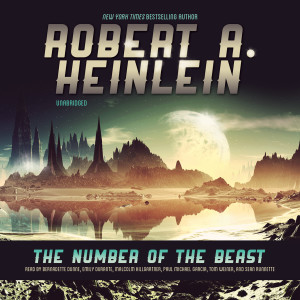 “He’s a Mad Scientist and I’m his Beautiful Daughter.”
“He’s a Mad Scientist and I’m his Beautiful Daughter.”
That’s what she said: the oldest cliché in pulp fiction. She wasn’t old enough to remember the pulps.
The thing to do with a silly remark is to fail to hear it. I went on waltzing while taking another look down her evening formal. Nice view. Not foam rubber.
She waltzed well. Today most girls who even attempt ballroom dancing drape themselves around your neck and expect you to shove them around the floor. She kept her weight on her own feet, danced close without snuggling, and knew what I was going to do a split second before I led it. A perfect partner—as long as she didn’t talk.”
Toward the end of his writing career, Heinlein wrote four novels that were attempts, however flawed, to tie together his fiction into what he called The World as Myth. The premise was that all worlds were merely fictions created by Storytellers. Some Storytellers, say Frank Baum, were the best at creating their universes; others were more mundane in the act of creation.
The Number of The Beast is the first novel in which this idea really was brought to the forefront by Heinlein, though some critics think Stranger in a Strange Land is where the World as Myth first was used by Heinlein (which might be true but I’m not re-reading that novel just to see if that’s true as it’s definitely not one of my favorite Heinlein novels).
The Number of the Beast has four first person narrators — two women, two men; two young, two older. They are Zebadiah John Carter, an engineer; computer programmer Dejah Thoris ‘Deety’ Burroughs Carter; her father, mathematician Jacob Burroughs; and Hilda Vorners, off campus socialite and sometimes lover of Jacob’s. (Did you notice the references to John Carter of Mars?)
The premise is that someone is out to erase these four from their timeline and would’ve succeeded if it hadn’t been that Mad Scientist (Jacob) has invented a device that allows the user to access the multiverse, including what you might have thought was mere fiction such as Oz. The flying ship they escape in a character herself — Gay Deceiver.
The story is a romp through both literature and the Future History of Heinlein’s metaverse with damn many a character from his extensive writings showing up here. The Coda itself is worth the time to read this large and sprawling book.
Now the really bad news. The full cast ensemble sucks on this audio production. Every voice characterisation of a major character, save that of Jacob, is cringingly wrong. Zeb Carter has a high twangy voice despite being described in the novel as having a deep commanding voice. And DeeDee manages to sounds like a complete airhead here, curious given that she’s an intelligent woman.
It reminds me of those book covers where the artist wasn’t required to read the book before rendering the artwork. Here I’ll blame the voice production person as they must have either not given any instructions on how the characters should sound, or didn’t give a fuck how they sounded. In a nutshell it’s quite probably the worst depiction of characters I’ve encountered to date.
Give this one a pass, just read the book.
(Blackstone, 2012)
